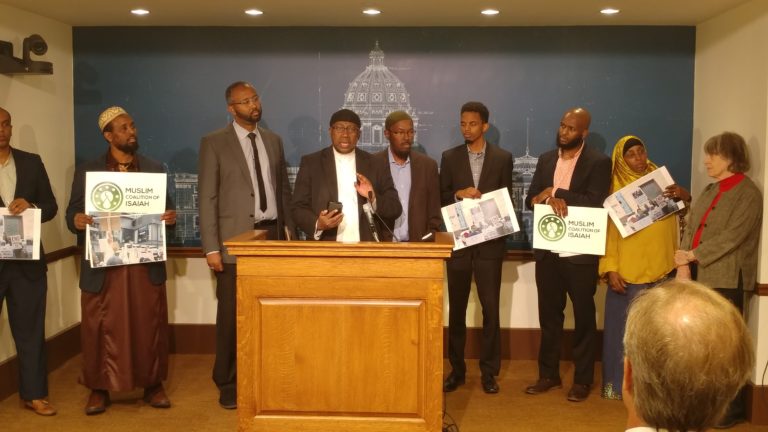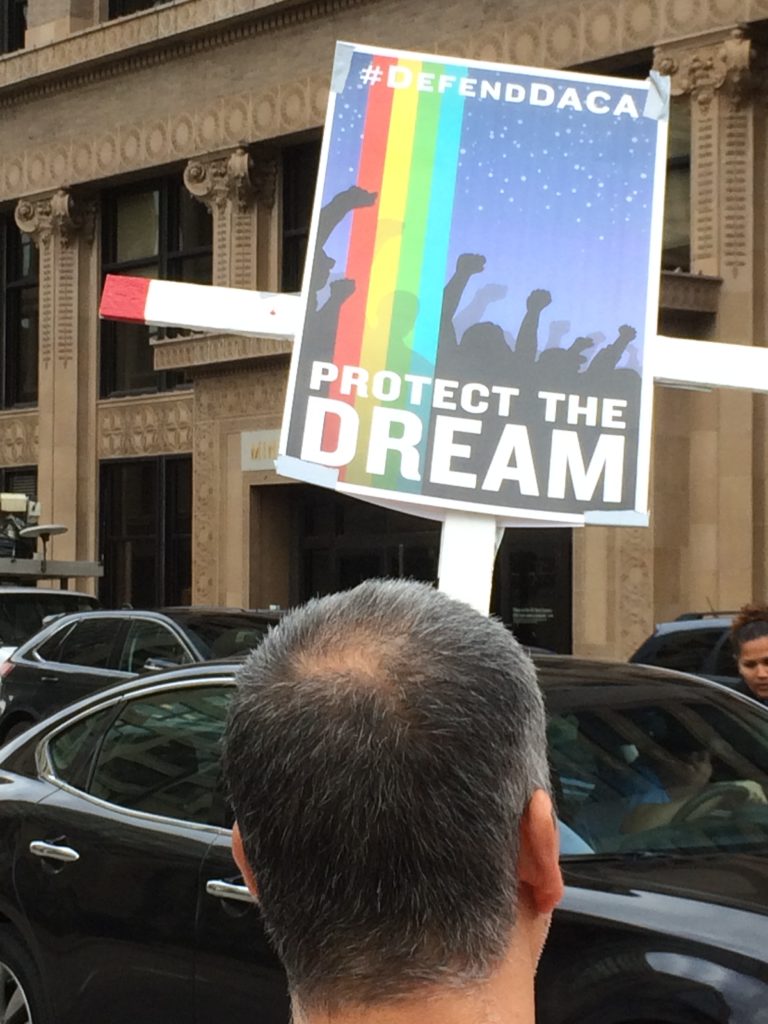Attorney General Jeff Sessions ended immigration judges’ authority to administratively close deportation cases.
Archives
‘Suitcases full of cash’: The story behind the story

With the Somali economy in shambles because of civil war, many people living there depend on assistance from family members in the United States to pay for food, medicine, and other basic necessities. Somalia has little banking infrastructure. Years ago, the U.S. government forbade U.S. banks from sending money to informal banking systems in Somalia. That left Somali-Americans with no way to send money to relatives desperate for help—except by sending cash.
Last week, Fox News strung together anonymous sources and rumors to libel the Somali community in Minnesota. Minnesota Public Radio reported that one named sources, who also testified at a quickly-called legislative hearing, has a serious past history of making false and defamatory statements. He has been sued for his false statements in the past, and has apologized in writing, acknowledging the falsehoods. Continue reading
Dr. Ayaz Virji to speak at 2018 Gala
One Doctor’s Stand Against Hate from Jessica Wang on Vimeo.
Dr. Ayaz Virji, a noted speaker on the rise of Islamophobia since the 2016 election and the need to know and love our neighbors, will be the keynote speaker at the 2018 Gala of the Immigrant Law Center of Minnesota.
Dr. Virji and his family live in Dawson, Minnesota, a small town in western Minnesota. They moved to Dawson in 2014 because of his desire to practice medicine in an underserved area. Prior to 2014, Dr. Virji had practiced at a large health care chain in Pennsylvania, after receiving his MD from Georgetown University in 2000 and completing residency training in family medicine at Duke University Medical Center in 2003.
Last year, the Washington Post reported on Virji and Dawson, about increasing Islamophobia after the 2016 election, and about Virji’s response to it. They described the doctor coming to Dawson in 2014:
“Ayaz remembered that it “just felt right.” Wholesome. He had been wanting to get away from his job working for a huge health-care chain in Harrisburg, Pa., and find a way to practice what he called “dignified medicine.” The town seemed to want him, too, a doctor with a medical degree from Georgetown University and an interest in rural health. No one seemed to care that he was Muslim, of Indian descent, born in Kenya and raised in Florida. They just needed a good doctor. So the Virjis decided to move to Dawson.”
After 2016, the welcoming feeling changed. Since then, Virji and a local Christian pastor have worked together to address the anti-Muslim, anti-immigrant sentiments they have seen. The Washington Post article quoted from one of Virji’s public talks:
“You can sense I’m angry about that,” he said. “Wasn’t Jesus angry when he went into the temple and knocked over the tables of the money changers? He was angry. Injustice should make us angry! Okay? I am angry about the election. Because there is injustice there, and I have felt that within my family. And with the burning of mosques? And something like 150 bomb threats to Jewish synagogues? We should think.”
We look forward to hearing Dr. Virji as the keynote speaker at ILCM’s June 1 2018 Gala.
If you’d like to learn more, you can listen to the podcast with Carvell Wallace, or read the articles linked below:
- ‘Love Thy Neighbor’ (Washington Post, 7/1/17)
- Small-Town Doctor in Minnesota Gives Voice to Islam (Star Tribune, 7/15/17)
- A Muslim Doctor Caring for Trump’s America (Al Jazeera, 12/1/17)
Prosecuting Migrants for Coming to the United States
Fact sheet from the American Immigration Council (5/1/18)
“This overview provides basic information about entry-related offenses, including the significant costs incurred by the government conducting these prosecutions, the individuals who are subjected to them, and how the government’s rationale for carrying them out is not supported by the data.This overview provides basic information about entry-related offenses, including the significant costs incurred by the government conducting these prosecutions, the individuals who are subjected to them, and how the government’s rationale for carrying them out is not supported by the data.”
Daniel’s story: Living the Dream
Daniel is a Dreamer. He came to the United States in 2002 at age 15, without legal permission to remain. In 2012, President Obama established the very temporary, very partial security of Deferred Action for Childhood Arrivals (DACA). Because Daniel had arrived before 2007, was still here in 2012, was older than 15 and younger than 31, and had completed high school, he was eligible for DACA protection.
Besides being a Dreamer, Daniel is a husband, a father, a school social worker, and now a legal permanent resident. Daniel became a legal permanent resident after he married a U.S. citizen—and after he filed an application, provided background information, passed security checks, paid fees, waited for processing, and passed the required interview.
“I have a position that allows me to have some privilege and comfort,” he says. “Not everyone is so lucky. A lot of people get left behind. One of those people is my brother.”
Daniel’s family is one of many separated by U.S. immigration laws. “People who get to qualify for immigration status of any kind are those deemed worthy by our immigration system,” Daniel says. Being worthy, as defined by that system, means arriving in the United States at the right time and under the right circumstances, achieving a required level of education, having no criminal history, and more.
Making your way through the booby-trapped maze that is U.S. immigration policy is difficult at best, impossible for most. Though Daniel is highly educated and a school social worker, his only route to permanent residence came through his wife, who is a U.S. citizen.
Had Daniel not become a permanent resident through marriage, he would still be one of the DACA recipients now waiting apprehensively for the next court decision, the next Congressional vote, the next presidential Twitter tantrum.
Instead, he’s a permanent resident, looking forward to becoming a U.S. citizen. And he’s giving back to the country: as a school social worker, and as a member and board member of community organizations working to make this a better place for all.
Maya’s story: Proving citizenship

Sometimes being documented is not enough. With year of hard work and filing piles of papers, ILCM helped a family recover proof of their right to stay in the United States.
During a visit to family in Mexico in 2015, Maya’s* husband abandoned her and her three daughters. When she packed up and headed for home, the real trouble began.
Maya’s husband is a U.S. citizen. Their five-year-old twin daughters, Sara and Susana, were born in Mexico, but are U.S. citizens because their father is a citizen. Maya and her seven-year-old daughter, Isa, are both Mexican citizens. Her husband had taken all their documents with him, except for Maya’s green card. Despite Maya’s numerous attempts to reach him, he would not respond to her calls or the messages she left with his family.
* We have changed some names in this story. As a matter of policy, we usually change the names of immigrants when telling their stories. While the stories are real, and while the individuals have agreed to let us use their stories, we choose to protect their privacy by not using their real names.
Maya and the children got as far as the Laredo, Texas border crossing. Maya and Isa were questioned there for hours. Although Maya and Isa were both legal permanent residents of the United States, only Maya had proof of her status. Isa had no documents with her and they had no proof that Sara and Susana were U.S. citizens.
Eventually, the officers at the border found information in their records to say that Isa was a legal resident. They gave Maya a statement saying that Isa’s document was lost and needed to be replaced. They told her that they had found information for the twins, but could not release it to her. They did let the family back into the United States, telling Maya to replace the children’s documents.
Maya and the children settled down in Thief River Falls. She thought about replacing their documents, but did not even know where to begin. That’s when someone at H&R Block told her about the Immigrant Law Center of Minnesota. Maya came to see ILCM’s Martha Castañon in November, 2016, when Martha made one of her regular circuit-riding visits to Crookston.
“We filed Freedom of Information Act (FOIA) forms on all three in March, 2017 to see what would come up for each,” Martha recalls. “ILCM attorney Sheila Stuhlman also did an INFO Pass appointment and was able to get Isa’s A number.”
They waited for answers to the FOIA requests. ILCM also filed N-565 Application for Certificate of Citizenship for the twins in April, 2017. Finally, in May of 2017 word came back: the FOIA search turned up no record of Sara or Susana, and the application was denied because there were no records in June, 2017.
Isa got better news: records showed that she was a permanent resident, so Martha filed an application to replace her permanent resident card.
And they waited.
“I reviewed with Maya again the facts of when she and Isa got their visas,” Martha said. “She recalled that when she and Isa had their interviews at the consulate in Mexico, back in October, 2012, her husband had inquired about the twin girls. He was told that they had derivative citizenship but he would need to go to the U.S. Consulate in Guadalajara, Mexico to get their documents.”
When they went to Guadalajara, he and the twins were interviewed by a consular officer, and when he came out of the office he had what Maya called “blue papers.” Those were the papers he took when he abandoned the family.
Martha did not give up. She gleaned information on the father from Isa’s FOIA response, and ordered a copy of his naturalization certificate. Next, she put together affidavits explaining the circumstances, birth certificates, a marriage certificate, the father’s naturalization certificate, Maya’s I-551 card, photos and an application for replacement of the Certificate of Birth Born Abroad. All that, with a $50 fee for each girl, went in to the Department of State on November 30, 2017.
December came and went with no word.
In January, Isa’s I-551 card—her green card—arrived! Now she was safe, with the green card showing she was a legal permanent resident.
Still no word on the twins, not even a confirmation that the application had been received.
Finally, on February 12, 2018, Martha received the Certificates of Birth Born Abroad for Sara and Susana.
“I called Maya and she cried, she was so relieved,” Martha recalls. “All three girls now have social security numbers and were able to get school IDs. Isa’s FOIA record showed her father’s social security number, so Maya will be able to get assistance for her girls and go after him for child support. Maya cried tears of joy and she hugged me so much, thanking me over and over for our assistance.”
Teresa’s story: Through the desert

When Teresa* was seven, her mom said she was going to buy a pack of cigarettes for Grandpa. She did not return for four years.
Teresa’s mother had gone to the United States to find a better life for herself and her children. Teresa remembers, “She would send pictures, clothes, and toys.”
When her mother returned, she was “like an alien, like she was stolen and came back another person.”
The next time, her mother and dad took Teresa and her brother and sister with her. She remembers two days and a night on the bus, and then a day and a night at a “safe house,” with “no food, mattresses on the floor, and a freaking outhouse.”
Then came the desert, and eight hours of walking, lost for four hours out of the eight, finally finishing across the border. Four more days of travel brought the family to the K-Mart on Lake Street in Minneapolis and to a new life.
“Being an undocumented child is horrible,” she says. “My parents could have ended up in jail for trying to bring their own children here.”
The new country brought new experiences: the school bus, school lunches, getting lost and not having words to communicate. “The only English word I knew was donkey, and there are no donkeys in Minneapolis,” she recalls. She learned fast and became the interpreter for her parents, who seemed to work all the time.
Her mother had been robbed at places she worked, held up at gunpoint once, and cooperated with the police. That meant she qualified for a U visa. Applying meant giving all their information to immigration. What if they got deported before they got visas? More fear, until the day when the visa notification arrived.
“I ran upstairs like a crazy person!” Teresa recalls. Now they could live in the open, get social security numbers, apply for any job, and travel home to Mexico to see her beloved grandparents again.
Currently working and attending the University of Minnesota, Teresa dreams of earning a master’s degree in social work.
* We have changed some names in this story. As a matter of policy, we usually change the names of immigrants when telling their stories. While the stories are real, and while the individuals have agreed to let us use their stories, we choose to protect their privacy by not using their real names.
Why so many Twin Cities immigrant organizations are branching out to Greater Minnesota
As immigrants move to towns and cities across the state, immigrant organizations follow, providing services and helping immigrants build new lives.
A Judge Just Opened the Door to Restarting DACA. Here’s What That Means.
The judge said DACA must be re-started, including new applications—but not quite yet. First, the government has 90 days to convince him otherwise.
Flavors of the world; Taste of Nations: Overwhelmed with great food, entertainment—and lots and lots of people
At Taste of Nations in Austin, southern Minnesota celebrates immigrants and their cultures, old and new.





